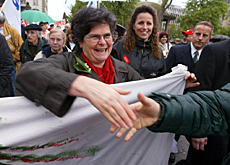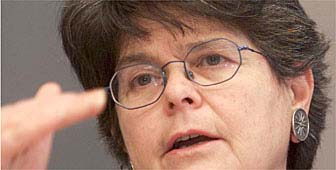Dreifuss leaves behind a controversial political legacy

Ruth Dreifuss has earned her place in Swiss history as the first woman and Jewish president and for her often controversial achievements while interior minister.
Even her political opponents concede that her retirement on December 31 marks an end of an era in Swiss politics.
Dreifuss reached the high point of her career in 1999 when, as part of Switzerland’s rotating presidency, she became the first woman to be the country’s head of state.
In her ten years as interior minister, Ruth Dreifuss presided over an intensive period of reforms to the country’s social security and pension schemes.
The Social Democrat also gave Switzerland one of the best and most expensive health systems in the world, as well as an innovative drugs policy.
But she was heavily criticised for increasing the retirement age for women, and for the rising cost of health insurance premiums.
Political newcomer
Dreifuss began as a trade unionist and had only a three-year stint with Bern’s municipal council, before joining the cabinet on March 10, 1993.
She took over at the interior ministry on April 1 and tackled her job with plenty of zeal, but was often criticised for being a perfectionist, not efficient enough and lacking the ability to delegate. However, her undoubted abilities and devotion to the job were never questioned.
Praise from opponents
As she retires, even her political opponents are prepared to admit that Dreifuss has earned her place in Swiss political history – but not without some criticism.
Christian Democrat president, Phillip Stähelin, said he appreciated her clear and direct style.
But he added that her obstinacy had once or twice hindered her in reaching more pragmatic solutions for her policies such as with health insurance.
“But on the whole she worked very hard for the well-being of our country,” he told swissinfo.
But Stähelin is concerned about the number of interior ministry dossiers that will still be open on her departure, including social security.
Committed fighter
The centre-right Radicals have praised Dreifuss as a committed fighter for Social Democratic concerns in parliament.
In a written statement, they also paid tribute to her work on behalf of women and in the dismantling of the welfare state in Switzerland.
Wrong policy
Only the rightwing People’s Party said they were not sorry to see Dreifuss go.
“I appreciated Ms Dreifuss as a very obstinate and ‘without frills’ politician,” said party president Ueli Maurer.
But he added: “Her policies were wrong. She leaves us a great deal of unsolved problems in social security. From this perspective, we welcome her retirement.”
Success and failure
Dreifuss herself has said that a political career is a mixture between success and failure.
She counts the health insurance system among her successes but was disappointed when her maternity insurance plans were not accepted by parliament.
Dreifuss said at the announcement of her retirement in September that she hoped her social reforms would continue in her wake.
And despite the ups and downs of her career, Dreifuss has described it as a “rich” experience and one that was a “daily source of joy”.
Born January 9, 1940.
Elected to the cabinet on March 10, 1993.
Head of interior ministry since 1993.
President of Switzerland in 1999.

In compliance with the JTI standards
More: SWI swissinfo.ch certified by the Journalism Trust Initiative










You can find an overview of ongoing debates with our journalists here . Please join us!
If you want to start a conversation about a topic raised in this article or want to report factual errors, email us at english@swissinfo.ch.